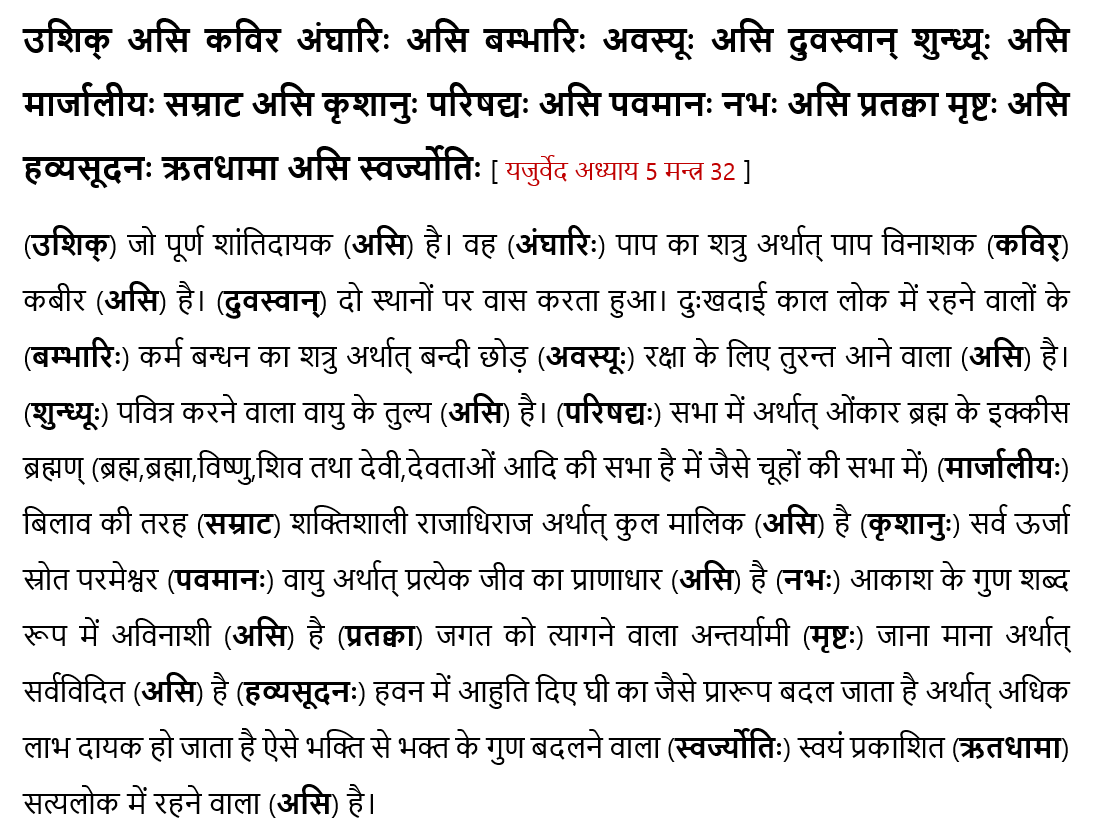Yajurveda Chapter 5 Mantra 32
 Minutes to read.
Minutes to read.
Yajurveda Chapter 5 Mantra 32 - God Kavir (Kabir) is the enemy of sins and enemy of bondage
उशिक् असि कविर अंघारिः असि बम्भारिः अवस्यूः असि दुवस्वान् शुन्ध्यूः असि मार्जालीयः सम्राट असि कृशानुः परिषद्यः असि पवमानः नभः असि प्रतक्वा मृष्टः असि हव्यसूदनः ऋतधामा असि स्वर्ज्योतिः
Ushik asi Kavir anghaarih asi bambhaarih avasyuuh asi duvaswaan shundhyuuh asi maarjaaliyah samraat asi krishaanuh parishadyah parishady iti parisadyah asi pavamaanah nabah asi pratakveti pratakvaa mrishthah asi havyasoodan ritadhaamaa asi swahjyotih
The one who is (Ushik) completely peace-giving (Asi) is. He is (Anghaarih), the enemy of sin, i.e., the destroyer of sin, He is (Kavir) Kabir (Asi). (Duvasvaan) Residing in two places — in the sorrowful realm of Kaal and in the eternal realm — He is the (Bambhaarih), the enemy of karmic bondage, i.e., the liberator from bondage, and (Avasyuh), the one who comes instantly for protection (Asi). He is (Shundhyuh), the purifier, like the wind (Asi). (Parisadyah), among the assembly, that is, in the council of Omkaar Brahm's 21 brahmands (including Brahmā, Vishnu, Shiv, goddesses, gods, etc. — like a cat among mice), He is (Maarjaaliyah), like a cat, and (Samraat), the powerful emperor, i.e., the Supreme Master (Asi). (Krishaanuh), the source of all energy, the Supreme God. (Pavamaanah), like the wind, He is the life-force of every living being (Asi). He is (Nabhah), imperishable in the form of the quality of sound in the sky (Asi). (Pratakvaa), the one who renounces the world, the indwelling witness, (Mrishtah), the well-known, i.e., the all-famous (Asi). (Havyasoodanah), just as ghee offered in a fire ritual transforms into a more beneficial form, likewise, by devotion, He transforms the qualities of the devotee. (Svarjyotih), self-illuminated, and (Ritadhaamaa), residing in Satyalok, the eternal true realm, (Asi) is.
Gist: Ushigasi = (bestower of complete peace) Kaviranghariasi = (Kavir) Kabir God (Angh) of sins (Ari) is the enemy (Asi) is, i.e., Kabir is the destroyer of sins. Bhambarisi = (Bhambari) enemy of bondage (Asi) is, i.e., Kabir Parmeshwar is Bandi Chhod (the liberator).
Meaning: This Yajurveda mantra describes Kabir as a divine figure with the power to bestow complete peace and liberation. Ushigasi refers to Kabir as the "bestower of complete peace." Kaviranghariasi identifies him as the destroyer of sins, where "Kavir" refers to Kabir, "Angh" represents sins, and "Ari" means the enemy, emphasizing that Kabir is the enemy of sins. Bhambarisi depicts Kabir as the "enemy of bondage" or "Bhambari," symbolizing his role as the liberator, or "Bandi Chhod," who frees individuals from spiritual bondage. In essence, Kabir is portrayed as a powerful, divine God who not only brings peace but also frees people from the chains of sin and suffering.
Yajurveda Chapter 5 Mantra 32
